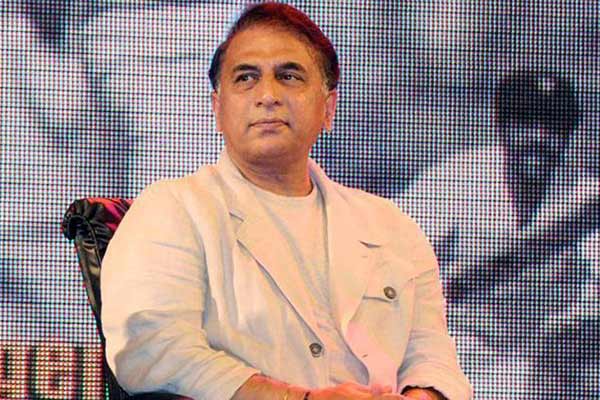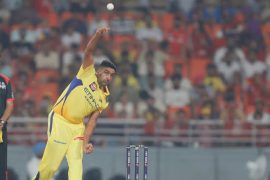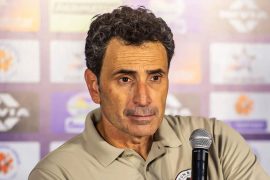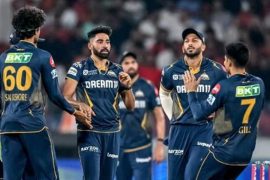Cricket legend Sunil Gavaskar on Friday batted for making sports affordable, part of school curriculum and a career option to create a positive atmosphere for sports in the country.
“I think India’s biggest plus is its population. It should not be difficult to find champions. I am not necessarily saying gold medalists,” said Gavaskar. He opined that there are three things essential to make sports affordable.
The first was that playing sports should be affordable. The next was that it should be part of the school curriculum, where the sportsperson gets some allowances or incentives in academics as well. The third was making sports a serious career option, he said.
Gavaskar was speaking during a panel discussion on ‘Making sports in India’, jointly organised by the Ashwini Sports Foundation and the Embassy Group.
“The moment sport becomes a career option, then everybody, the child, the parents they all get involved in that. Then schools can come in and help by making sports part of their curriculum. I think then we have a win-win situation,” Gavaskar pointed out.
He said making sports a career option would attract more youngsters to take to such activities and parents too would not stop their children from taking to it. Gavaskar said cricket was flourishing in India because the game has emerged as a career option.
“We dont necessarily have to play in the IPL, dont necessarily have to be an international player.
Today you play Ranji trophy cricket, you can still make a good career. You make more money than you would be working for a corporate or working for the airlines or the Railways or working for a government company, Gavaskar said.
Former badminton player Aparna Popat said sports should not be seen from the dimension of winning medals. Citing the example of the Rio Olympics-2016, she said 11,200 athletes from over 200 nations had participated, but only 366 medals were distributed. On promoting sports in India, she opined that if governance and funding were put together efficiently and effectively, sports can give a lot more.
“It can give health, it can help the economy, it can help in the social structure of the nation and as well as the national pride.” Popat underlined the need for more CSR funding in sports.
“All that is required is a synergy, collaboration and purpose,” she added.
Former sprinter Ashwini Nachappa, who moderated the discussion, gave a presentation on the initiatives by the Ashwini Sports Foundation in Kodagu. Endorsing her view, Embassy Group chairman Jitu Virwani, founder of the Equestian Academy, said channelising the CSR mandates of corporates towards sports would bring in a conducive atmosphere for sports in the country.
The other panelists were Volvo India president and Managing Director Kamal Bali and sports journalist Suresh Menon. Sports should be made affordable, says Gavaskar. Cricket legend Sunil Gavaskar on Friday batted for making sports affordable, part of school curriculum and a career option to create a positive atmosphere for sports in the country.
“I think India’s biggest plus is its population. It should not be difficult to find champions. I am not necessarily saying gold medalists,” said Gavaskar. He opined that there are three things essential to make sports affordable.
The first was that playing sports should be affordable. The next was that it should be part of the school curriculum, where the sportsperson gets some allowances or incentives in academics as well. The third was making sports a serious career option, he said.
Sunil Gavaskar was speaking during a panel discussion on ‘Making sports in India’, jointly organised by the Ashwini Sports Foundation and the Embassy Group.
“The moment sport becomes a career option, then everybody, the child, the parents they all get involved in that. Then schools can come in and help by making sports part of their curriculum. I think then we have a win-win situation,” Gavaskar pointed out. He said making sports a career option would attract more youngsters to take to such activities and parents too would not stop their children from taking to it.
Sunil Gavaskar said cricket was flourishing in India because the game has emerged as a career option.
“We dont necessarily have to play in the IPL, dont necessarily have to be an international player. Today you play Ranji trophy cricket, you can still make a good career. You make more money than you would be working for a corporate or working for the airlines or the Railways or working for a government company, Gavaskar said.
Former badminton player Aparna Popat said sports should not be seen from the dimension of winning medals. Citing the example of the Rio Olympics-2016, she said 11,200 athletes from over 200 nations had participated, but only 366 medals were distributed. On promoting sports in India, she opined that if governance and funding were put together efficiently and effectively, sports can give a lot more.
“It can give health, it can help the economy, it can help in the social structure of the nation and as well as the national pride.” Popat underlined the need for more CSR funding in sports.
“All that is required is a synergy, collaboration and purpose,” she added. Former sprinter Ashwini Nachappa, who moderated the discussion, gave a presentation on the initiatives by the Ashwini Sports Foundation in Kodagu.
Endorsing her view, Embassy Group chairman Jitu Virwani, founder of the Equestian Academy, said channelising the CSR mandates of corporates towards sports would bring in a conducive atmosphere for sports in the country. The other panelists were Volvo India president and Managing Director Kamal Bali and sports journalist Suresh Menon.
Disclaimer:
The information contained in this article is for educational and informational purposes only and is not intended as a health advice. We would ask you to consult a qualified professional or medical expert to gain additional knowledge before you choose to consume any product or perform any exercise.






